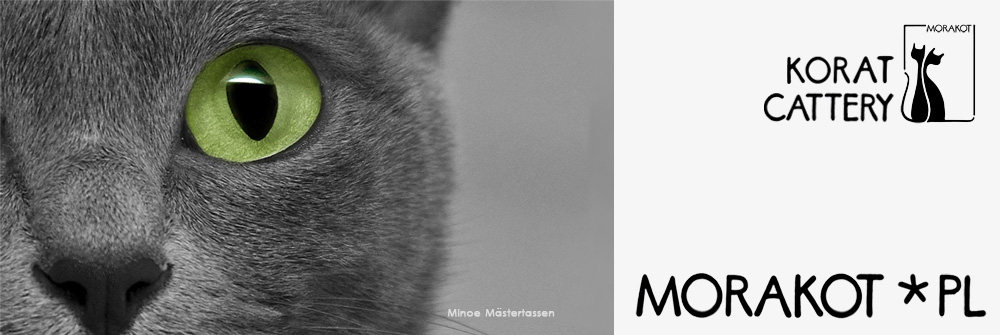Fifty years after the first cattery outside Thailand was established, the Korat is now a breed recognized by all feline federations in the world. Beside the USA, Great Britain and Norway, there is a narrow circle of breeders in Sweden, Finland, Denmark, Germany, Belgium, the Netherlands, France, Switzerland, Italy, Spain and Croatia, a few in Australia, Canada, Argentina and the RSA, and a couple of Korat pioneer breeders in Poland. The circle of breeders is small, so the Korat has, thankfully, not undergone many breeding modifications and is free from the congenital defects that many more popular breeds suffer from.
The worldwide cooperation of Korat breeders has brought about an unusual achievement as far as the heath of these cats is concerned. In the past some Korats had suffered from an incurable genetic disease, GM (gangliosidosis), appearing also in humans, which developed if both mother and father carried a faulty recessive gene, causing a neurological defect in their offspring. Using a DNA test that was set up to identify the carriers by Henry J. Baker MVD at Scott-Richey Research Center, Alabama, USA, all the breeding cats could be tested in order to ultimately exclude them from further breeding. Thanks to joint efforts of breeders, this dangerous disease has been completely eliminated from the breed.
The annual Phimai festival in Nakhon Ratchasima province in north-east Thailand, where the Korat comes from, attracts a lot of tourists. Attractions include the Korat cat competition (photos: Eva Krynda)
The purity of the breed has been kept to an unusually high degree – contemporary breeders outside Thailand do their best to keep its connection to its homeland and its close resemblance to korats living there. The principles of catteries are strictly adhered to, insuring that the uniqueness of the breed is maintained. Each cat must have documented Thai ancestors. Outcrossing is not allowed. Breeders sell kittens pledging the purchaser to respect the welfare of cats – determining, for example, conditions of breeding and obliging the new owner to treat the cats as indoor cats only – allowed out only under strict supervision. Such protection of Korats reflects the respect of this rare breed and its Thai history.





